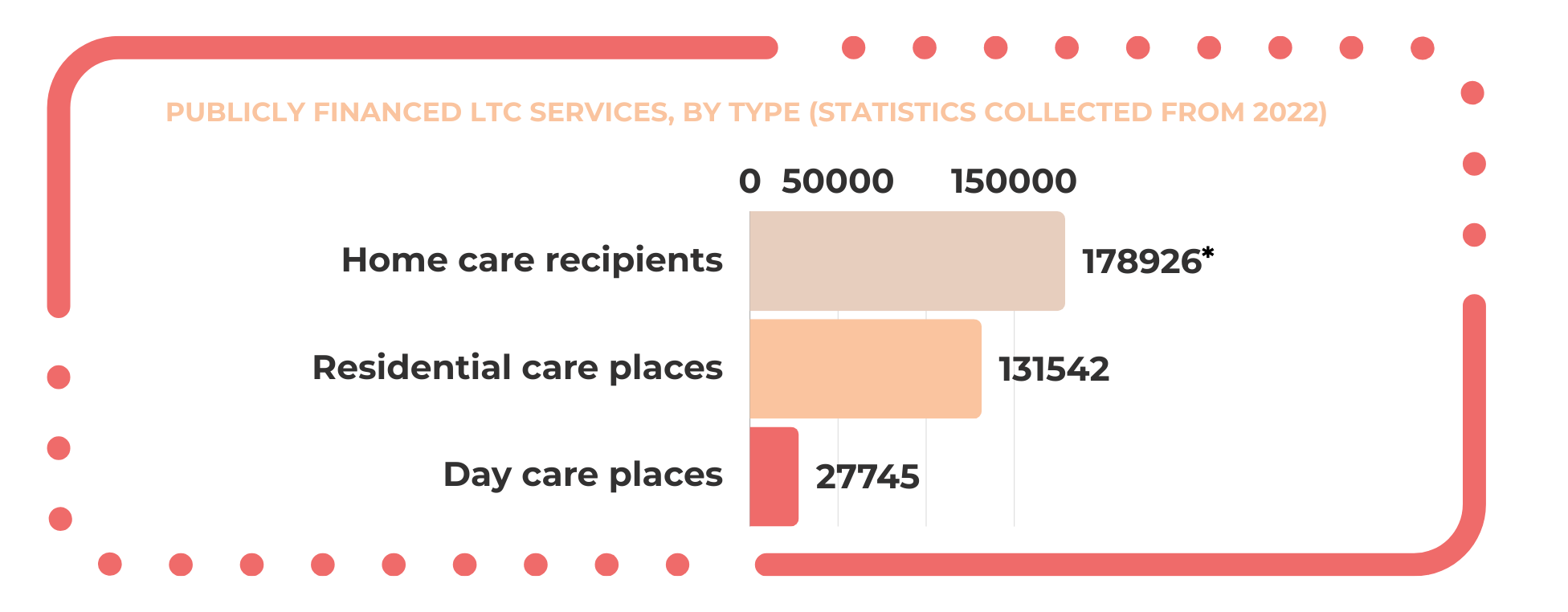Recommendation
Poland requires a clear strategy for developing social services, including transforming its long-term care sector, which continues partly to be based on institutional care. The pillars of the strategy should include the definition of a catalogue of community-based services, the establishment of a funding model for service development and principles of payment, and the integration of services provided in the health and social care systems. The strategy should be developed in dialogue with NGOs that provide services so they participate in co-creating services. The transition to community-based care should be made in dialogue with front-line professionals, people receiving care, and their families.
Social services legal and policy framework
Right to access social services ❌
Regulations in Poland do not explicitly recognise social services as a citizen’s right.
Definition of social services ✅
A basic definition of social services is provided in the Law of July 19, 2019, on the Implementation of Social Services by the Centres for Social Services.
It lists 14 services that fall under this definition:
1) pro-family policy, 2) supporting the family, 3) foster care system, 4) social assistance, 5) health promotion and protection, 6) supporting disabled people, 7) public education, 8) counteracting unemployment, 9) culture, 10) physical culture and tourism, 11) stimulating civic activity, 12) housing, 13) environmental protection, 14) professional and social reintegration.
The municipality is responsible for these services to meet the needs of the local community. These services are provided directly to individuals, families, social groups, groups of residents with specific needs or residents in general.
National catalogue of social services ❌
Polish legislation does not define a full catalogue of social services. In 2024, social services directors called for creating such a catalogue.
Strategic plan for social services ✅
The Strategy for the development of social services and public policy until 2030 (with an outlook to 2035) was adopted in 2022. It defines goals and indicators for different areas such as child protection, long-term care, social inclusion of people with disabilities, mental health and homelessness.
Responsibilities of local authorities 🤝
The Ministry of Family, Labour and Social Policy is responsible for the strategy of developing community-based social services to meet the needs of people in need of support in their daily life. In addition to creating a framework for the deinstitutionalisation process, the Ministry financially supports the development of various services for dependents, older people, and people with disabilities through dedicated programmes developed by local authorities.
Local authorities must provide social assistance. Municipalities and Counties cannot refuse to help a person in need. Assistance can also not be denied by entities, for example third sector organisations, to which municipalities and counties have delegated these responsibilities.
Non-governmental organisations play an important role in providing social services.
Social services expenditure
Expenditure on social assistance (2022): € 28,000,000,000 * / 5.45 % of the total GDP
*The state budget classifies expenditure on social services as social assistance and “other social policy activities”. This category includes both financial benefits for citizens and services. Expenditure at the regional and local levels are similarly classified. According to the Ministry of Family, Labor and Social Policy, 2022, central budget expenditures on social assistance amounted to about € 28 billion (120 billion PLN). A significant part of this amount (up to 40 %) is spent on financial benefits supporting 500+ families.
Coverage
Number of social workers in national, regional and local public social services (2023) – 6,496 / FTE: 6,208
Source: Ministry of Family, Labour and Social Policy
Long-term care (LTC) for older people
- Number of older people aged 65+: 9,797,700 / 26% of the population (2023)
- Number of people in need of LTC: 140,000 / 2% of the population older than 65 (estimate)
- Total number of older people 65+ in LTC: 269,928
People in LTC aged 65+ (Statistics collected from 2023):
a. Residential and home care financed by the Ministry of Health: 102,226
b. Residential care financed by the Ministry of Social Affairs: 67,702
c. Home care financed the Ministry of Social Affairs: 100,000* (est.)
* There are no separate statistics on older LTC recipients in the social care sector, therefore an estimation was made, based on the estimate that about 90 % of home care recipients in the social sector are older people.
Sources: a) Ministry of Health, 2023, b) Ministry of Family and Social Policy, 2022 c) Ministry of Family and Social Policy, 2023

Source: Ministry of Family, Labor and Social Policy, 2022

*Home care is provided under two systems: health and social care. Number of people receiving home care services under the health system (LTC): 69,847. Number of people receiving home care services under social care: 109,079.
Source: Ministry of Health. 2022, Ministry of Family and Social Policy, 2023

Source: Ministry of Family and Social Policy, 2023
Long-term care (LTC) for people with disabilities (PWD)
5,447,548 PWD/ 14.3 % of the total population (2021)
Source: Central Statistics Office, 2021
Number of publicly financed LTC places by type:
a. Residential care: 46,312 (2022) / 0.85 % of PWD covered
b. Day care: 49,131 (2023) / 0.90 % of PWD covered
Sources a) GUS / Central Statistics Office, 2022, b) Ministry of Family and Social Policy, 2023

83,467 PWD worked in sheltered workshops
Source: Ministry of Family of Social Policy, 2023
Child protection services
75,338 children in alternative care in 2023

Source: CSO/Central Statistical Office, 2023
Women’s support
51,631 women victims of domestic violence (2023)
Source: Police statistics, 2023
54 crisis support centres provide support for women victims of domestic violence (2021)
Homelessness and social housing
There are 46 accommodation places for homeless people per 100,000 inhabitants (2022)
Source: Ministry of Family, Labor and Social Policy, 2022
126,425 families were waiting to rent a flat from the municipality's stock, and 70,200 families were waiting for a social lease.
Source: CSO/Central Statistical Office 2022
3,251 social housing apartments were built in 2023
Source: GUS / Central Statistics Office, 2023

